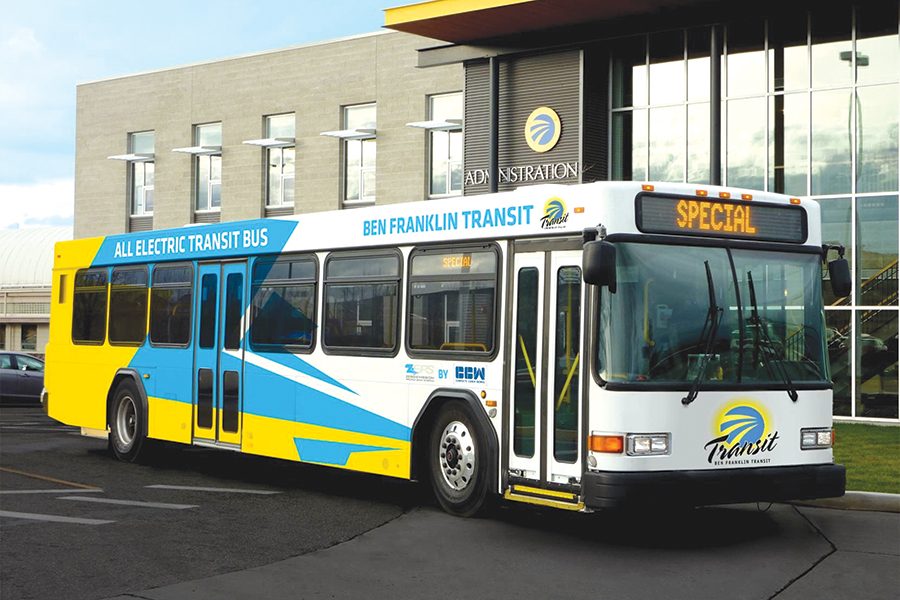
Home » Ben Franklin Transit aims to attract ‘choice’ riders
Ben Franklin Transit aims to attract ‘choice’ riders

May 11, 2022
Ben Franklin Transit’s director of planning and service development does not own a car.
Keith Hall gets around the Tri-Cities by bike, scooter and by bus, something he says is becoming a realistic option as the transit agency invests in initiatives to make riding the bus more convenient to all residents.
Ben Franklin Transit is intent on building a transit system that will allow more Tri-Citians to follow his lead, he said.
The regional transit agency is developing more and faster routes that fit with everyday activities and make taking the bus a viable option to driving.
“We want to make it so anybody can live here without a car,” Hall said. “I think we’re not far away from that. If people use the (Ben Franklin) system, they can do that.”
Ben Franklin is amid an initiative to establish service every 15 minutes along key roots and to install hubs to facilitate service and its Connect program, which ferries prospective riders to bus stops.
It is also upgrading its 1,000-plus bus stops to meet Americans with Disabilities Act standards in a bid to not only serve people with disabilities, but to offer a friendly entry point to everyone who needs easy access to the system.
Executing on its long-range plan to expand ridership comes at a time when the transit system’s 0.6% sales tax is under scrutiny. The transit board shelved a proposal to trim it when it met in April, but it isn’t done talking about it.
Without the taxing authority, the district would lose out on an estimated
$7 million in state grants under the Move Ahead Washington package, which sets aside $3 billion for transit systems.
Will McKay, chair of the board as well as a member of the Benton County Commission, acknowledged the Move Ahead package complicates the discussion. He said the district would still be functional without the money, but he would like to see voters weigh in.
He expected the board to revisit the discussion at its May 12 meeting, after the deadline for this publication.
McKay said he understands complaints that buses seem empty to nonriders. Boosting ridership is key, he agreed.
Buying land to build new hubs
The most visible sign of the effort to bolster ridership is occurring on a sliver of land next to the Southwest Richland Park & Ride at Columbia Park Trail near the Queensgate Drive roundabout.
That’s where Ben Franklin Transit is installing the first of a series of new hubs to link riders with frequent bus service and the Connect program. The private property owner is completing site work before the transit agency steps in to construct it, along with a new driveway onto Columbia Park Trail.
The second hub will serve downtown Pasco. In March, Ben Franklin closed a $500,000 deal to buy the former Bank of the West building at 1115 W. Clark St.
It has identified but not yet purchased property for a hub in western Pasco. It is searching for a suitable location in Kennewick’s Southridge area. The final hub will serve Benton City and Prosser.
It all adds up to offering riders the option to choose transit over cars.
“It’s around making the service more attractive and reliable relative to people’s actual activities. If service runs every 12 to 15 minutes, it’s easier to manage the wait,” Hall said.
Riding by choice
Marie Cummins, communications director for Ben Franklin Transit, acknowledged the system caters to people who are considered “transit dependent” and lack other options for physical, financial or other means.
It wants to deepen its ridership by attracting people who ride by choice, she said. Riders-by-choice will use the system if it fits their needs, she said.
Upgrading bus stops is another priority that has the secondary benefit of making the system friendlier to all.
The ADA upgrades require public amenities be accessible to people with disabilities.
Only 16% of BFT’s 1,000-plus bus stops meet ADA requirements. The
$1.3 million contract will update about 40 bus stops per year. The goal is to raise the number of ADA complaint stops to 22% or better over the course of the contract, which is for one year with a one-year extension.
In April, it approved a two-year agreement with ESF Development LLC to add concrete pads, shelters, seats and garbage cans at Ben Franklin bus stops.
There are many reasons a stop may not be compliant. If people who use wheelchairs can’t access the bus because of gravel or grass, that’s not ADA compliant.
The new Pasco hub will mirror the Queensgate one when it opens in about two years. It will feature pickup and drop-off bays, charging stations and possible office space for the transit agency. It will operate in tandem with Pasco’s existing 22nd Street Transit Center, near Isaac Stevens Middle School
Hall said the 22nd Street center is only walkable to people at nearby apartment complexes and stores.
The newish Connect program is another strategy to bring more potential riders into the system. Connect, operated by a third party, provides on-demand rides to transit stops for people who are outside of walking range.
Since it launched in April 2020, Connect has grown to more than 8,500 users per month, according to transit monthly ridership figures. Users are limited to rides to bus stops in their zones – a rule implemented to keep the system from being turned into an accidental taxi service.
By comparison, about 145,000 people rode transit buses in March and the system reports ridership is rebounding from the Covid-19 pandemic, with service up 62% on buses and 40% on paratransit, the safety net services that serve individuals with disabilities.
Hall, the development director who doesn’t have a private vehicle, said technology is another way to boost ridership. When he first arrived about four years ago, he opened a popular transit app and was shocked to find Ben Franklin wasn’t on it.
The Transit App (Transit: Bus & Subway Times, featuring a green icon on app sites) serves transit systems around the world, from New York to London to Tokyo.
Now it works in the Tri-Cities too.
A recent survey indicated 90% of Ben Franklin Transit passengers have smart phones.
“People will get a phone before a car,” he said.
Local News Transportation
KEYWORDS may 2022




